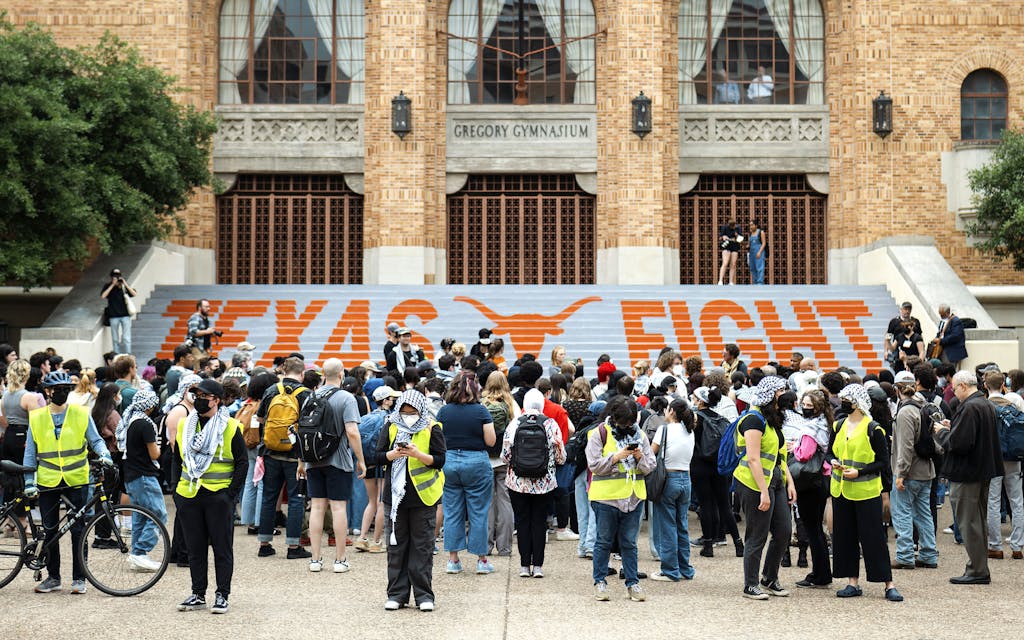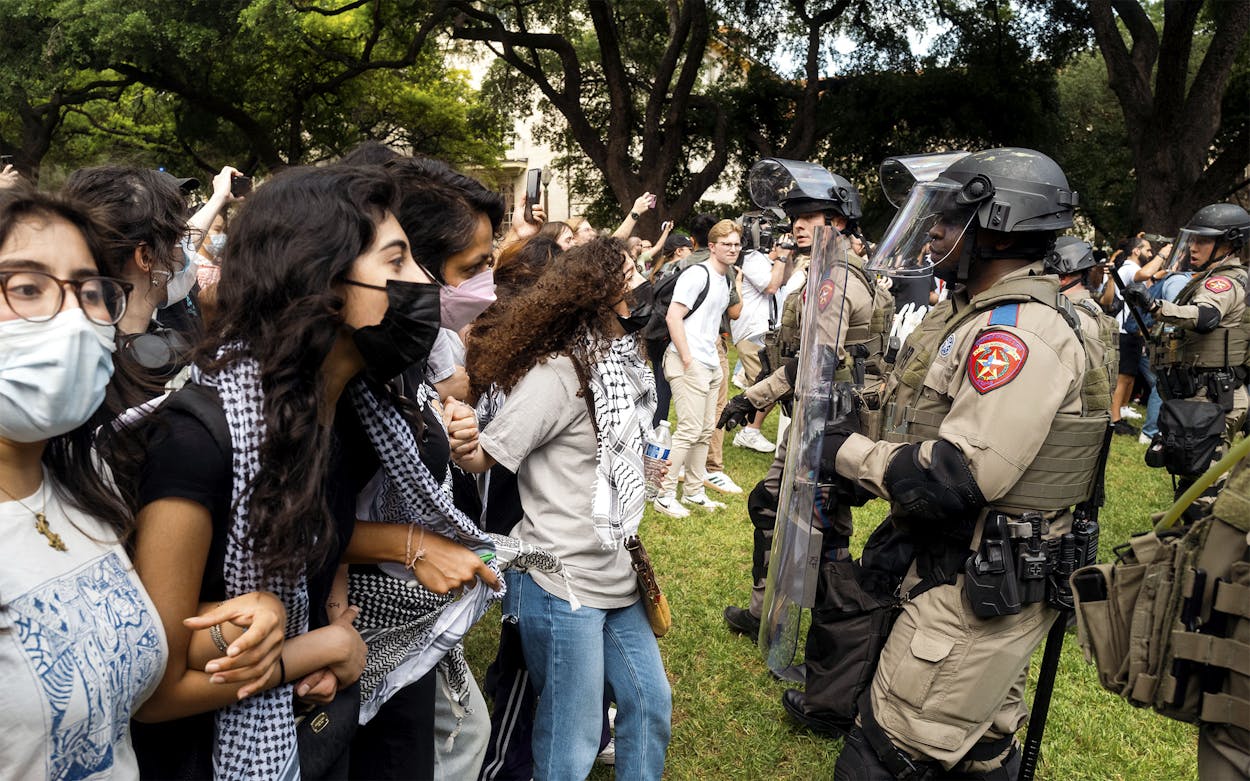Mohammed, a 21-year-old economics major at the University of Texas at Austin, has only sporadic communication with his extended family in Gaza. He might hear from them a couple times a week—usually in a text, sometimes in a video, or maybe in a phone call if he’s lucky. Whatever the medium, he said, the news is never good. “You don’t even feel happy about that ‘I’m alive’ text,” he said, “because you know, at that same time, they might only have two minutes left.”
His family, whose home is in the center of the Gaza Strip, was trying to make it down to Rafah, in the territory’s southernmost region, a couple weeks after Israel began its ground invasion. Subjected to an embargo on food and water, his relatives cooked bread on a pile of trash they lit on fire.
A few months ago, Mohammed received a video from his family—one he will never forget. A line of other displaced Palestinians waited for the meager food his family was cooking, Mohammed recalled, but his cousin wasn’t eating—he was handing all of the bread out to others. “I’m sure he was hungry,” Mohammed said. “I know that kid.”
Mohammed, who asked to be identified by his first name because of concerns for his safety, is a steering member of the Austin chapter of the Palestine Solidarity Committee (PSC). The student-led organization has been active in Texas for decades and advocates for a Palestine free of Israeli occupation. He sees organizing as a vital aspect of what it means to be a part of the Palestinian diaspora in the United States. He helps organize teach-ins, rallies, marches, and divestment campaigns. “You have a responsibility . . . to raise the banner of Palestinian liberation wherever you are—at school, in your workplace, or in your community.”
Doing so has proved difficult in Texas and nationwide. This past week, all eyes have been on American universities—including Columbia University, the University of Southern California, and Emory University—where administrators have encouraged law enforcement to aggressively crack down on campus protests, including occupations of plazas and lawns by students demanding that their schools divest from companies that manufacture weapons being sent to the Israeli military. On Wednesday, state troopers descended on students in large numbers at UT’s South Lawn, tackling some as they carried out violent arrests.
That afternoon, hundreds of students and other protesters had gathered to call for the University of Texas system to withdraw investments from Boeing, General Dynamics, Lockheed Martin, Northrop Grumman, and RTX (formerly Raytheon). It was supposed to be a calm affair, according to the organizers, who planned a walkout from classes that would culminate at the south lawn in front of the iconic UT Tower, an area they planned to peacefully occupy.
But the night before the protest, the university sent a letter to the Palestine Solidarity Committee demanding that the organization cancel the event, saying it would disrupt campus operations and violate university policies. Refusal to comply could result in arrest, the letter said. By the morning of the protest, access to both the plaza in front of the UT Tower and the South Lawn were blocked. The heavy hand of law enforcement descended on campus—several dozen campus and city local police officers as well as state troopers; the latter wore riot gear, and some were armed with assault rifles. By 1 p.m., the group of more than two hundred protesters was stalled on Speedway, a thoroughfare near campus, where it had been herded by police. At one point, one of the state troopers on a motorcycle revved his engine as he circled the protesters, threatening arrest if they did not disperse immediately. More than ten protesters were detained while on Speedway, many of whom were tackled by law enforcement.
One PSC general member, a female student who wore nondescript clothing—a white T-shirt, jeans, and a face mask—and asked to remain anonymous, citing safety concerns, said police aggressively disrupted the protest even though the students complied with all of the rules given to them, such as not using megaphones. The PSC member said that if law enforcement had let the students carry out their plan, “no one would have gotten hurt, no one would have gotten arrested, [and] this would have been a peaceful gathering.”
After protesters made their way to the South Lawn, law enforcement officers arrested at least twenty more, tackling some. Still, those gathered remained by the hundreds, locked arm in arm while chanting for a free Palestine and for their school to divest from weapons manufacturers. Some protesters weaved through the crowd, passing out water and food. “This was students rising to meet the moment in a way that I’ve never seen,” said Safa Michigan, who graduated from UT last year but often returns to participate in protests on campus. “You could really see the full might and power that we are up against, and yet students still chose to gather and to express their right to protest.”
In an Instagram post Wednesday evening, PSC called on the Austin community to gather outside Travis County jail to support more than fifty arrested students. (Fifty-seven protesters were arrested, though the Travis County district attorney dropped 46 charges as of Thursday afternoon, according to the Texas Tribune.) After police had left the scene, protesters were back on the South Lawn, this time peacefully and without incident.
On Wednesday afternoon, as the protest was underway, Governor Greg Abbott expressed his support for the aggressive crackdown. “These protesters belong in jail,” he said of the students. “Students joining in hate-filled, antisemitic protests at any public college or university in Texas should be expelled.”
UT president Jay Hartzell released a statement Wednesday night saying that the university “held firm” in “enforcing our rules while protecting the Constitutional right to free speech.” He went on to say that UT “will not be occupied.” On Thursday morning, Brian Davis, the senior manager for issues and crisis communications at UT, reiterated Hartzell’s statement as well as sentiments from the UT Division of Student Affairs, which said that the school “will act first and foremost to allow those critical functions to proceed without interruption.”
But many students and faculty saw the law enforcement response as excessive. Another students-and-faculty walkout was announced Wednesday evening and was underway by Thursday afternoon. A group of concerned UT faculty members released a statement ahead of the walkout: “There can be no business as usual when our campus is occupied by city police and state troopers who are preventing our students from engaging in a peaceful demonstration of their First Amendment rights.”

On March 27, weeks before the protest, Abbott signed an executive order that directed all higher education institutions in Texas to review their free speech policies, with the stated goal of reinforcing punishments for speech that he deemed antisemitic. The order called out PSC and Students for Justice in Palestine by name.
It labeled as antisemitic a chant frequently heard at protests opposing Israel’s actions in Gaza: “From the river to the sea, Palestine will be free.” The reference, covering all the land between the Jordan River and the Mediterranean Sea, can be understood as stating that Palestinians should be free of Israeli occupation in both the West Bank and Gaza. But it can also be interpreted as implying that Jewish Israelis should be driven from all the land that had been Palestine before the founding of Israel in 1948.
Brian Klosterboer, a staff attorney at the American Civil Liberties Union of Texas, called Abbott’s order a dangerous stifling of the free speech rights of protesters. “Antisemitism is a very real problem and it’s deeply concerning for all of us,” he said, “but this definition that the governor is pushing has been criticized as conflating what is actually antisemitic with legitimate criticism of the government of Israel.”
“When we say ‘from the river to the sea,’ we’re talking about Palestinians just being liberated from the oppression that they’ve been enduring,” said Ammer Qaddumi, who is Palestinian, a steering member of PSC, and a junior majoring in economics at UT. Qaddumi was arrested during Wednesday’s protest, seconds after he yelled out to the crowd to disperse to avoid arrest. (He was released Thursday afternoon and the charges against him were dropped.)
Abbott was not the only state official to lambast Wednesday’s protest. Lieutenant Governor Dan Patrick, on X, thanked the university police and the Department of Public Safety “for shutting down the attempted takeover of the university by pro-Hamas protesters.”
Student organizers have rejected such claims. “We were not affiliating with the institution of Hamas,” said one organizer, a student with the Austin chapter of the Party for Socialism and Liberation, who worked security for the protest on Thursday. Qaddumi also said claims that the Palestinian movement’s mission is antisemitic are baseless. “To claim that [our rhetoric] calls for the killing of Jewish people is to ignore everything that the movement stands for.” Qaddumi and other organizers say there is a profound distinction between antisemitism—an accusation often leveled at the Palestinian liberation movement—and anti-Zionism, which contends not with Judaism but with a Jewish state that seeks the expulsion of Palestinians.
PSC has stressed that part of its mission is to ensure the safety of Jewish community members, and it often works alongside the Jewish organization Jewish Voices for Peace (JVP). Ronnie Gelman, a member of Austin’s chapter of JVP, said that the group’s pro-Palestine activism falls in line with its Jewish values. “There is a thriving movement of anti-Zionist Jews who are still very Jewish, leaning into our Jewish values, into Torah, and into our ancestry in this time as sources of strength—and a part of that is standing with Palestinians,” Gelman said.
Still, Jewish community members and university students have expressed differing views on the matter. On Wednesday, some Jewish students reported feeling unsafe and harassed because of the protest, according to the Texas Tribune; others, meanwhile, told Nexstar that they did not feel threatened or unsafe. The day before the protest, Rabbi Stephanie Max, the executive director of Texas Hillel, a Jewish student life organization at UT, said the planned event had a “hateful agenda.” The evening after the protest, Max issued another statement, stating that Wednesday was “an incredibly challenging and sad day on campus.”
Palestinian students and pro-Palestine organizers, however, point to a pattern of harassment and violence that has made them feel increasingly unsafe. In October, outside a PSC teach-in, Mohammed, Qaddumi, and other members were approached by three men not affiliated with UT, wearing casual clothes and holding up flyers with headers reading “Kidnapped.” The men repeatedly called the students “f—ing terrorists.” As students filmed the men, one of them said: “You can also film next week when I’m in Israel. We’re killing Arabs, motherf—ers.” In February, a man was accused of stabbing a Palestinian American near UT’s campus, and he was later indicted for aggravated assault with a deadly weapon by a grand jury. While the university stressed that the incident did not occur on campus, organizers countered that it could have. And earlier this month, after praying at a local mosque, a Muslim student reported being harassed and attacked by three men while walking back to campus. He told police that he suffered cuts, bruises, and a busted lip.
The university, which declined to make president Hartzell or another representative available for an interview, said it condemns violence and the harassment of Muslim and Palestinian students. But some student activists feel the university has done little to address these incidents. “We want the university to just at least acknowledge our presence, the real dangers that we face, and the real struggles that we face as students here on this campus and in this state,” Qaddumi said. “The bare minimum is what we’re asking for.”
- More About:
- Politics & Policy
- Austin






